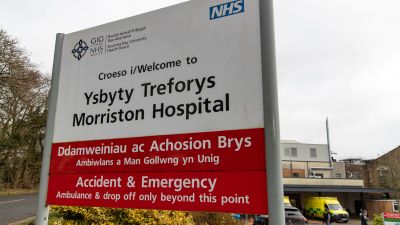Five patients lost in one shift: Morriston Hospital medics on the severity of the second Covid wave

Frontline healthcare staff at Morriston Hospital have said coronavirus patients needing intensive care are sicker than in the first wave, with the majority of those put on intensive ventilation unlikely to survive.
Five coronavirus patients died in the space of 12 hours on an intensive care ward at the Swansea hospital, they added.
Morriston Hospital would normally have around 200 medical patients at any one time; that number has risen to around 300.
Intensive care consultant Dr John Gorst said the deaths were taking an immense toll on everyone involved.
He said: "Sometimes we’ve seen many patients die in the same 12- hour shift.
"In some 12-hour periods we have lost up to five Coronavirus patients.
"Usually we expect to see, on average, one patient a day dying in the intensive care unit.
"To have five die on one day is unprecedented.
"That's been a real struggle for their families and for the staff dealing with it. It has been a real challenge for everyone involved."
Dr Gorst went on to explain how the second wave was proving to be significantly more challenging than the first, with patients coming to them in much worse conditions.
Most of the patients were adults of working age with no notable medical conditions, he added.
"We do have better treatments for Coronavirus now. They aim to keep people out of intensive care" he said.
"If it wasn’t for the treatment given on the wards, intensive care would have been completely overwhelmed.
"However, when patients have failed on these treatments, sadly the safety net of the intensive care unit, the safety net of getting them on an invasive ventilator, largely doesn’t work."Most patients at the moment who come to intensive care to go on an intensive ventilator, sadly will not survive.
"These patients are mostly of working age.
"They don’t have any significant medical conditions. This is alien to us as an intensive care unit. We expect far more patients to survive. Now they are not.
"That’s because we are seeing a different group of patients who are just not responding to the treatment, unfortunately."
What happens in an intensive care unit (ICU)?
Intensive care is needed when a patient is seriously ill and requires intensive treatment and close monitoring.
It can also be used to help people recover from surgery.
Most people in an ICU have problems with one or more organs.
ICUs have witnessed a surge in coronavirus patients since the pandemic began although they are also responsible for caring for patients who have had heart attacks, strokes or a severe head injury.
In an ICU there will usually be one nurse for every one or two patients, known as nurse-to-patient ratios.
However, nurse-to-patient ratios have been placed under immense strain as coronavirus forces more patients into intensive care.
Senior matron Carol Doggett, head of nursing for medicine at Morriston Hospital, said that patients dying without having any close family beside them was also having an impact on healthcare staff.
She said: "The biggest thing for us is the absence of family, particularly at end of life, when a nurse steps in and becomes their next of kin, almost, the person that sits there and holds their hand.
"Which we would do anyway, naturally, but in the absence of family it’s far more profound than supporting them in a holistic way if they were present with us.”
Despite the huge emotional and mental health challenges Morriston's frontline staff were up against, Mrs Doggett said there was a strong sense of unity amongst staff to help one another through this latest phase of the pandemic.
"What we have seen is the workforce coming together – not just nursing but medics, therapists, social services, domestic services, portering, all coming together for one cause" she said.
"We knew it was there before but it’s far more evident at the moment. I think staff take strength from that.
"The health board has put on a suite of services to support our wellbeing, which I know a number of us are accessing as groups and individuals.
"That is making a difference.”
Read more: